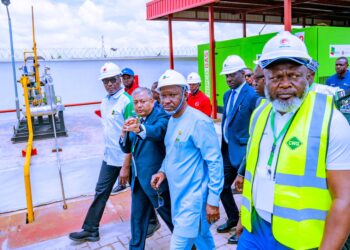Ekperikpe Ekpo, Nigeria’s Minster of State for Petroleum Resources (Gas) has said that the Petroleum Industry Act (PIA) is a solution to the infrastructural deficits that have plagued Nigeria’s gas sector, and the PIA is already bridging that gap.
He said this during the October 24 Domestic Gas and Gas Infrastructure Summit (DGGIS) which took place in Abuja. He said:
- “In addressing the infrastructural deficit that has long held our gas sector, the implementation of the Petroleum Industry Act (PIA) marks a watershed moment. The PIA framework on strategic interventions such as the Midstream and Downstream Gas Infrastructure Fund (MDGIF) is already bridging the infrastructure gap that has existed fostering an environment that attracts investments, and innovation which are crucial for expanding our domestic gas utilization and infrastructure.
- “These advancements are not just in anticipation of domestic growth but strides towards making Nigeria a pivot in Africa’s gas market and indeed the world.”
More Insights
Ekpo said that as the world is gradually moving towards reducing carbon emissions, the Tinubu administration acknowledges the vital role of natural gas in Nigeria’s transition to cleaner energy.
According to him, natural gas is not just a temporary solution; it is a long-term solution that will help Nigeria align with global climate goals by reducing carbon emissions.
Ekpo stated further that the government’s strategies and initiatives are focused on increasing domestic natural gas consumption and putting an end to the wasteful practice of gas flaring.
He highlighted the fact that programs such as the Gas-to-Power, Gas-based industries initiatives, and the Nigerian Gas Flare Commercialization Programme (NGFCP) demonstrate the country’s dedication to these objectives.
During his presentation, Ekpo said that the Tinubu administration has a vision for natural gas in Nigeria which goes beyond pipelines and power generation; it aims to create a gas-based economy that benefits all citizens.
The goal is to ensure that every Nigerian is included in and benefits from this economic transformation.
To support these gas expansion projects, Ekpo said that the government is restructuring financing models, which will not only boost the economy but also provide cleaner and more efficient energy solutions.
Additionally, the government is exploring the potential of alternative energy sources, with methanol production showing significant promise as a part of this effort.
What you should know:
Kelvin Emmanuel, Non-Executive Director at OA Markets Nigeria, has previously highlighted the lack of infrastructure as a significant roadblock for gas deployment in the country.
According to him, a significant problem in the gas supply chain is the lack of investment to expand the gas pipeline network from 2,000 to 7,000 kilometres.
This limited network hampers efficient gas transportation, affecting its availability in areas with increasing energy needs. He also highlighted the rising costs of Engineering, Procurement, and Construction (EPC) activities, crucial for investment decisions, and make the situation worse.
These high costs discourage potential investors and stakeholders from supporting gas supply projects. Furthermore, the substantial expense of importing the large steel pipes (20-40 inches in diameter) needed for high-pressure transmission pipelines adds to the complexity of the issue.






















